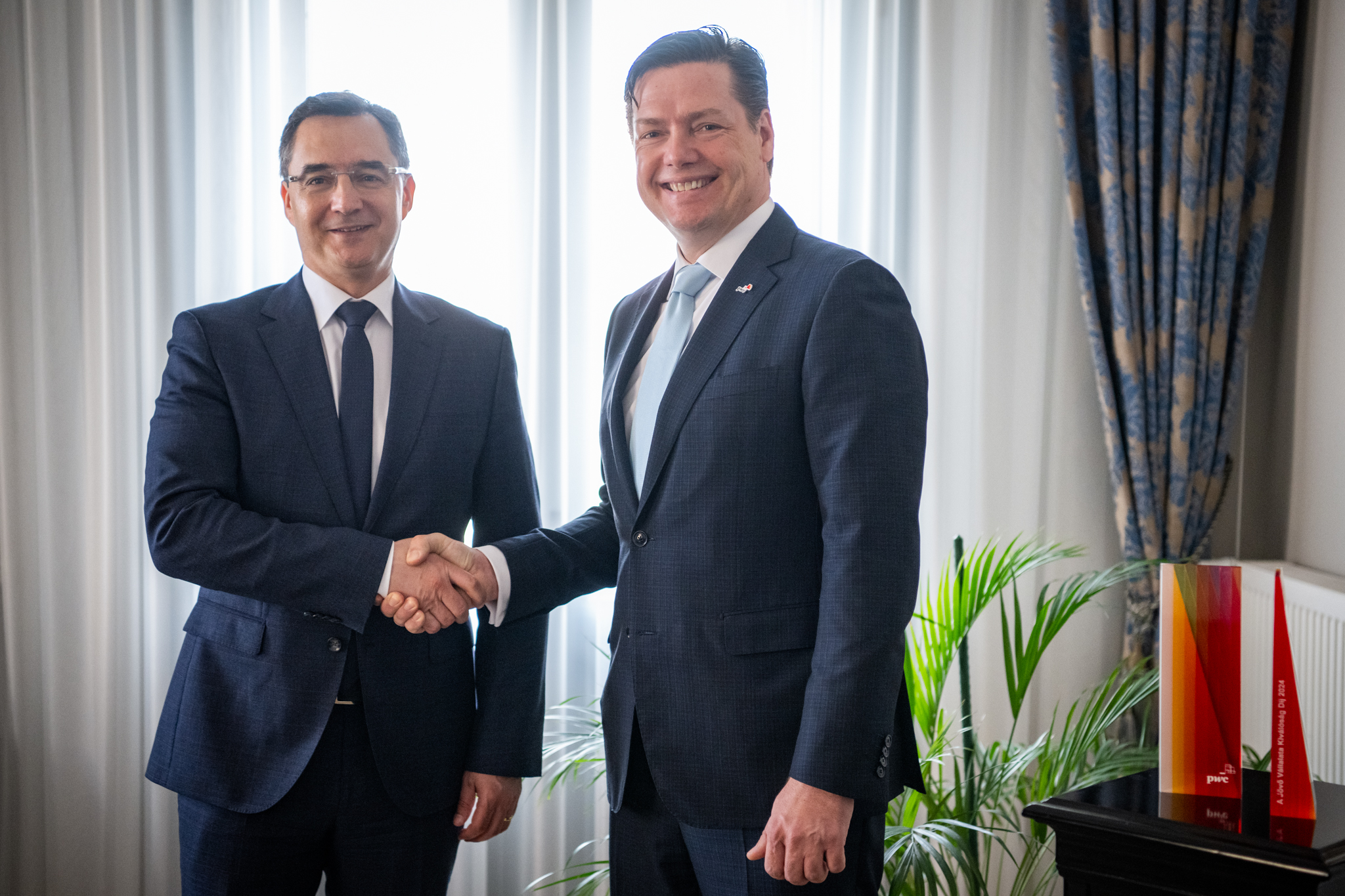Building on the talent

IT Services Hungary, the country’s leading provider of ICT services, is celebrating its tenth birthday. But while proud of its achievements, CEO Chris Wilson says he is already looking forward to how the company will evolve.
Chris Wilson, CEO of IT Services Hungary
“I don’t want us to be celebrating our 20th anniversary and find that ITSH20 is basically the same company as ITSH10,” says Chris Wilson. The company, founded in 2006, and now employing 4,400 across four sites in Budapest, Debrecen, Pecs and Szeged, has done extremely well, but will need to continue to evolve, he says.
ITSH operates in the highly-competitive SSC market. Given that its speciality is IT services, that puts even more pressure on finding the human talent needed to deliver excellence, particularly given the now widely recognized labor shortage in Hungary.
“One of the challenges not just getting staff in the first place, but retaining good people, making sure they are motivated to want to stay,” acknowledges Wilson. One key, he says, is to invest heavily in training and education, recognizing that people are not always able to pick up all the skills they will need simply from being at work. “Some skills are very new, like OpenStack [software that controls large pools of computer, storage, and networking resources throughout a datacenter] support and developments for the cloud. We have to take responsibility for providing the right training.”
Right people
Finding the right people in the first place also helps, of course, and ITSH has made a virtue of close connections with the colleges in its host cities. “Our university relations are very good: 75% of our staff in Debrecen come through the university there. We have a lot of respect for what they can do. We have a track record of working well with universities; we are able to sit down with them and tell them what skills a student needs. It is not just generic IT knowledge, though that remains important, but also how we can prepare for future technologies. That is why we are doing a lot of training now around new technologies; we need to work constantly with universities to ensure we can support each other with this.”
The average age of the staff at ITSH is just 32 years, meaning the operation needs the sort of structure appropriate for a global corporate organization (the company is part of T-Systems International GmbH, and thus Deutsche Telekom AG), yet with the flexibility a young workforce is looking for. “As many as 30% are able to work from home, and not just on odd days; they have a proper work-from-home contract,” says Wilson. “We make sure they have the right work environment first, we audit the environments continuously. It is a very structured process that also gives an opportunity to people who do not live in one of the four cities in which we operate, but are out in the countryside, to work for a global organization.”
Competitive
ITSH recently announced plans to create another 360 jobs in its countryside locations. The fact that money is being targeted at the provincial cities is deliberate. “We first took the decision to go to the countryside seven years ago. We did so because Budapest was competitive, and now the countryside is getting more competitive too. The market is maturing; companies like ours and other SSCs are investing in Hungary and the skills levels are rising. When we started in 2006, we were basically a customer workbench; if there was a job done in London or Germany that could be done cheaper here, it was moved; two jobs here, four jobs there. Now we have a lot of skill and experience here, we are seeking to leverage that, to move up the value chain, delivering end-to-end services,” Wilson explains. “We want to become more innovative in what we deliver, whether that is through automatization of what we already do, or by looking at innovative ways of finding solutions for the future. We are already starting to contribute to the parent company in terms of products and services, rather than just supporting what is there already. So it is not only standard services that we deliver. We are also able to offer other opportunities, no longer just attracting graduates, but also experienced managers and technicians. For example, we recruited a team of skilled resources in Hungary for the platform that supports Deutshce Telekom’s Open Cloud solution, OTC.”
With such experienced staff, there is the constant threat of employees being poached by competitors, although, as Wilson says, that is a two-way street: ITSH picks up more than its fair share of talent from competitors. “Staffing will always be a challenge, but I do not think there is anything wrong in that. I have never worked in an environment that was not competitive. We need to be constantly looking at how we can be better than our competitors.”
Celebrating by giving backWhen it came to celebrating its birthday, ITSH decided it wanted to do something positive for Hungary and beyond, and established a weeklong Innovation Boot Camp, led by global chief creative officer Jason Romeyko. “Rather than just beating their chest and saying how fabulous they are – and they are pretty fabulous – these guys have invested their time and energy into giving something back to the community,” explains Romeyko. The aim was to take the UN’s 17 Sustainable Development Goals, and hothouse and brainstorm ideas until they came up with two schemes that could make a genuine difference. The first, the District 13 Project, is a response to goal 11 (“Make cities inclusive, safe, resilient and sustainable”). The idea is to take the big data that already exists around vehicles, merge it with data about pedestrians, and use those to inform smart junctions that warn drivers about inattentive pedestrians, and pedestrians about the presence of vehicles, through the use of infotainment systems in cars, and smartphones, smartwatches and even smart clothing (Deutsche Telekom is already researching this latter element in Germany) for pedestrians. “The problem is that no one looks forward anymore, everyone is looking down,” Romeyko says. The dangers of even walking along a sidewalk caused by our love affair with smartphones and earphones will only be made worse by the spread of ever quieter hybrid and electric vehicles. Romeyko cites a study by the United States’ National Highway Traffic Safety Administration that predicts a 19% increase in traffic accidents involving pedestrians. Budapest’s District 13 has one of the highest vehicle-pedestrian accident rates in the city, and the project envisages a pilot junction to test out technologies including smart pavements that light up as a warning for all those looking down rather than forward. The second idea, the Coding Ladder Project, is a response to Goal Four (“Ensure inclusive and quality education for all and promote lifelong learning”). It seeks to break the poverty cycle of a disadvantaged background leading to less education, leading to unemployment. That has particular relevance in Hungary, where 63% of Roma children never attend secondary school, and the project will also seek to help solve the fact that Hungary currently needs 22,000 coders. The idea is to provide the children with a coding curriculum that encourages them to stay in the school environment, albeit in a dedicated unit, and through a ladder process leads to a qualification. The pilot would see five poor rural communities targeted, linked via the internet to spur connections and add a competitive element. Students would use smart technologies to grow vegetables that they could take home, hopefully incentivizing parents to keep their children in the system, and would be given part time coding jobs along the way, to further boost experience. “The experts we had at the boot camp were very critical about feasibility, and I am very grateful for that,” says Romeyko. “Both these projects are doable, we could start today and we are looking for the right partners to help make that happen. I think it is a very generous thing to do for a tenth anniversary.” |
SUPPORT THE BUDAPEST BUSINESS JOURNAL
Producing journalism that is worthy of the name is a costly business. For 27 years, the publishers, editors and reporters of the Budapest Business Journal have striven to bring you business news that works, information that you can trust, that is factual, accurate and presented without fear or favor.
Newspaper organizations across the globe have struggled to find a business model that allows them to continue to excel, without compromising their ability to perform. Most recently, some have experimented with the idea of involving their most important stakeholders, their readers.
We would like to offer that same opportunity to our readers. We would like to invite you to help us deliver the quality business journalism you require. Hit our Support the BBJ button and you can choose the how much and how often you send us your contributions.







